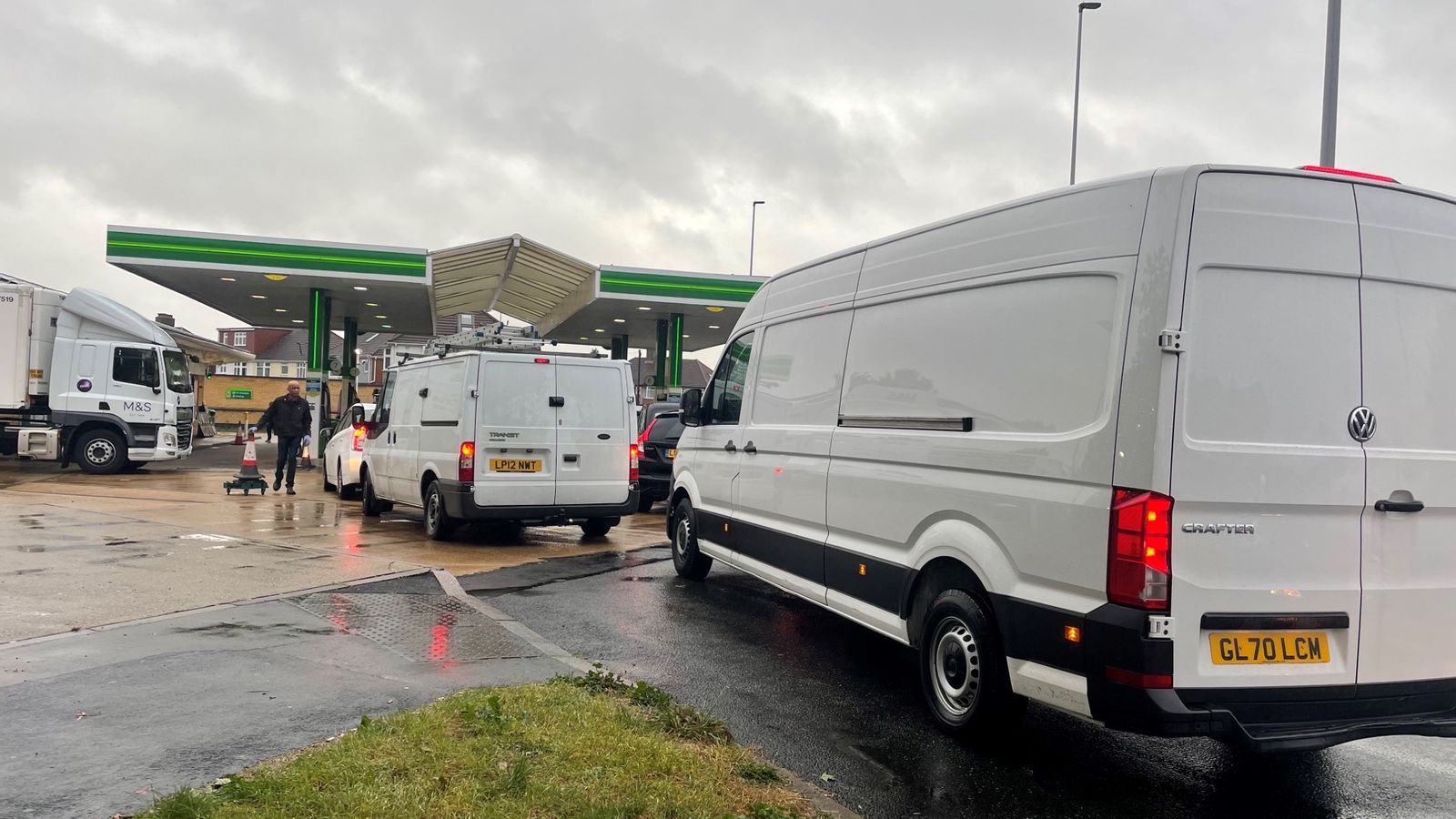There are signs that panic buying at the pumps is “calming down” and motorists are “getting back to normal buying habits”, the environment secretary has said.
Speaking on the new Sky News programme, The Great Debate, George Eustice said that Saturday saw demand for fuel at UK forecourts about 50% higher than normal levels but by Sunday it had gone down to 20% above average.
Please use Chrome browser for a more accessible video player
He said the government was “leaving no stone unturned” when it came to ensuring filling stations have enough supplies and again insisted there was no shortage of fuel.
It comes as the fuel industry said there was “plenty of fuel” at UK refineries and terminals and that it was expecting demand “will return to its normal levels in the coming days”.
Motorists were encouraged to buy fuel as they usually would in a joint statement from BP, Shell UK, Esso Petroleum/ExxonMobil, Wincanton, Certas Energy UK, Hoyer Petrolog UK, Greenergy, Fuels Transport & Logistics, Downstream Fuel and Suckling Transport.
Meanwhile, Surrey Council has said that it, “like the rest of the country”, is facing significant disruption to fuel supplies. It pledged to “ensure vital public services can continue to be delivered”.
Mr Eustice said of the national picture: “There are signs that this is calming down and that people are getting back to normal buying habits. As soon as they do this the situation will be resolved.”
Fuel crisis: Government puts army on standby to help with deliveries ‘as a precaution’
Gas price crisis: Shell’s household supply arm nets customers of failed rival Green
Labour conference: Shadow chancellor Rachel Reeves accuses Rishi Sunak of being ‘missing in action’ amid supply crisis
He was also asked if keyworkers should get priority to fuel – which the majority of the 100-member virtual audience seemed to agree with.
The minister said he could understand why people have sympathy for that argument – but on balance prioritising certain people “overcomplicates things”.
Please use Chrome browser for a more accessible video player
Mr Eustice said he thought it would be up to individual businesses whether they made that decision – possibly in a similar way to how during supermarkets dedicated an hour a day for NHS staff and the elderly during food shortages at the start of the COVID pandemic.
However, on the programme, his government was accused of having “failed” by an NHS worker who wants keyworkers to get fuel priority.
Sharon Dhillon said: “Why is it left to the individual forecourt to decide? Why can’t the government make a decision to do something constructive instead of blaming everyone else and not looking at themselves. Because it is deafening.
“We should not be put in this situation. I should not have this conversation with you right now. But I am because you’ve failed.”
Please use Chrome browser for a more accessible video player
The long queues at the pumps are the latest consequence of a shortage of truckers which is causing widespread disruption in the UK, including some empty supermarket shelves.
The prime minister’s official spokesman said earlier there were currently no plans to use the military during the fuel crisis, beyond assisting with moves to reduce the backlog of HGV driver tests.
But the government has now put the army on standby and soldiers will be deployed if needed.
The UK needs 100,000 more HGV drivers if it is to meet demand, according to the Road Haulage Association (RHA).
The trucker shortage has been blamed on a number of factors including many foreign HGV drivers returning to their home countries because of Brexit, a backlog of HGV driver tests due to the pandemic, and an ageing workforce.
Also the job’s nomadic lifestyle, high cost of training and a lack of facilities for drivers have been blamed for putting off younger candidates.
Mr Eustice said “we need to bring more dignity to these jobs”.
He said there was “a lack of patience for HGV drivers on the roads, motorists don’t tolerate the fact that they block up roads when they are trying to get goods through the system”.
“We have got to give more respect for that profession” and “have a culture change to appreciate some of these roles more”.
“And we don’t necessarily do that by opening the door to lots more immigration, sometimes it does need higher wages and better working conditions”.
HGV driver Andy Potts told the programme the current crisis was a “watershed in the industry because it’s bringing to life the conditions that people are having to live under and work under”.
And former HGV driver Steve Jackson, who left his job three years ago, said: “The older people are retiring, the EU people are moving back to the EU. It’s not an attractive job for younger people to come into.”
The government on Sunday announced a plan to issue temporary visas for 5,000 foreign truck drivers to try and plug the gap.
But Andrzej Dobrowolski, a 44-year-old Pole who owns a construction and transportation firm in Britain, said many drivers would laugh at such a proposal.
“Boris Johnson is inviting the drivers back and they are laughing,” Mr Dobrowolski said. “They are saying: why should they quit their companies in Poland or Bulgaria or Romania or anywhere in the EU for four months?
“What the British don’t understand is that it’s not just the money that’s important,” he said. “Their offer is at least three years out of date.”






















